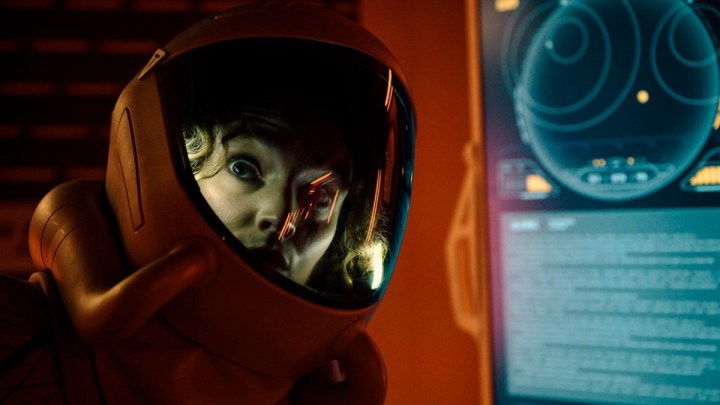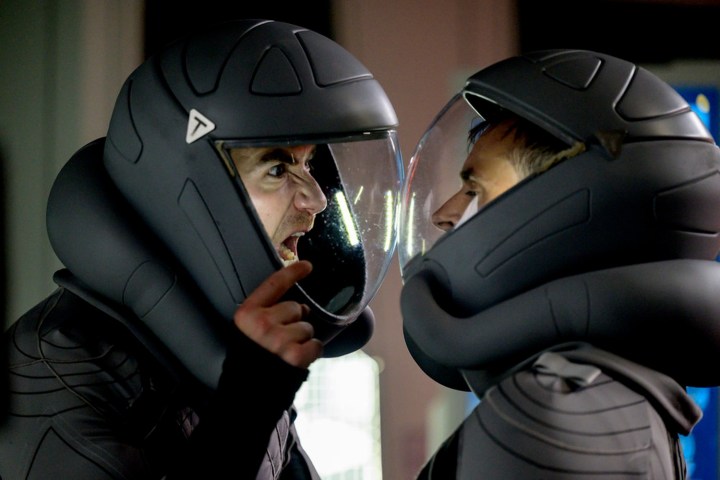In the Syfy show The Ark, colonization missions are necessary for the survival of the human race. One-hundred years into the future, the first group of humans board the spacecraft Ark One and set a course for a new planet to serve as their future home. Traveling aboard a spaceship into the unknown — what could go wrong?
In The Ark‘s case, just about everything goes awry after a disastrous event destroys critical sections of the ship and kills most of the high-ranking officials on board. With one year remaining on their trip and resources dwindling, Lt. Sharon Garnet (Maid’s Christie Burke), Lt. James Brice (The Sandman’s Richard Fleeshman), and Lt. Spencer Lane (The Outpost’s Reece Ritchie) must act quickly and take control of the ship before it’s too late. Created by Dean Devlin (Independence Day) and Jonathan Glassner (Stargate SG-1), The Ark is an intense “lost in space” drama that forces a diverse crew to rely on each other to survive.
In an interview with Digital Trends, the cast and creators of The Ark share their love for space, note the show’s similarities to Game of Thrones, and explain why good characters are the most important aspect of a television series.

Note: This interview has been edited for length and clarity.
Digital Trends: Dean and Jonathan, you are both back in space creating a TV series. What makes space such a good setting for a show?
Jonathan Glassner: It’s the great frontier, as they said on Star Trek. It is the only frontier left other than maybe the deep ocean. It’s a fertile ground for adventure, fun, and discovering new things and challenges.
Christie Burke: I think there’s something as an audience member that’s so exciting about the unknown. It’s almost like a common fear I feel with everybody, which is this idea of what’s out there. I get excited watching sci-fi stuff like that.
Something always goes wrong in these shows or movies. I always wonder if you could make a show where nothing went wrong. It’s like, “We got there. That’s it.”
Dean Devlin: [Laughs] I like this idea. No drama or conflict.
Burke: It lasts one episode.
It can be like a reality series.
Devlin: It would be a webcam, you know?
Christie, your character is thrust into a leadership position right away. Did you draw inspiration from any leaders in media or real life?
Burke: Absolutely. I feel like leading up to the audition, I watched so many strong female and male characters in shows because, obviously, I’m standing on such huge shoulders with Sigourney Weaver, Demi Moore, and stuff like that. I just wanted to try to do something different and say something different, but still respect and stand on those amazing shoulders too. I’m a big film fan. I watch a lot of shows and movies, so I feel like it would be a disservice not to.

Reece and Richard, your characters are also viewed as leaders, but they have this distinct, sometimes brash, way of going about their business. What was appealing about each of your characters?
Reece Ritchie: I think the situation calls for this kind of gallows humor, so the brashness probably comes from the desperate situation that they all share. With regards to this leadership, that’s not a done deal for any of these three lieutenants. Not only have you got the environment, [but] you’ve also got this interpersonal relationship and interpersonal conflict, which is constantly changing, fracturing, [and] reforming.
Richard Fleeshman: There’s a little echo of Game of Thrones in fighting for the chair. Throughout the series, the captain’s chair remains vacant for an awfully long time, maybe indefinitely. It’s always the pride of place in the bridge. It’s kind of in the background. Everybody’s got their eye on the prize. Certainly, Lt. Garnet steps up to the plate and does an amazing job initially.
Burke: Initially? [Laughs] Give me some more credit!
Ritchie: She does alright …
Does that mean dragons will be in the future if it’s like Game of Thrones?
Fleeshman: There are dragons, yes. Spoiler alert.
Ritchie: That was actually the working title, I think. Space Dragons.
Burke: I actually put that in my contract. Will only do it if there are space dragons.
This was mostly shot in Serbia. I saw many Instagram photos of the cast hanging outside of work. I’ve done this enough that I can tell which actors are lying when they say the cast got along throughout filming. Judging by these photos and how you’re all talking, I do believe you all got along and bonded.
Ritchie: It was amazing.
Fleeshman: It was amazing, yeah. There was something about doing a show that’s set in space where the characters are thrust into a situation. They’re finding a family from such an eclectic bunch, and they’re just thrown together. There’s like brotherhood bonds going on and sisterhood bonds going on. This whole dynamic [is] happening.
Then in real time, the actors playing them are going through exactly the same thing. We had a really eclectic, diverse group of people from all over the world. Because we were in Eastern Europe, it allowed for the cast to be even more diverse than if it were to be filmed somewhere else, just through visa restrictions and stuff. So it was amazing. We really became a family for essentially four-and-a-half months. It was amazing, actually. Really amazing.
Burke: We still stay in touch with everybody, like I just recently was talking to [cast members] Christina [Wolfe] and Shalini [Peiris] and stuff like that. I felt like we all got so close. Yeah, it was just so beautiful and rare. You’re right, it’s rare that it happens.
Fleeshman: Really rare. Usually, you sit here going, “No, everybody’s great [smirks].”
They’re just smiling and nodding.
Fleeshman: Yes, smiles and nods

With the cast, a lot of the actors kept their natural accents. Jonathan, was that a deliberate decision to make this an international crew?
Glassner: Yeah. You figure in the future, if this ever happens and we do have to send an arc, you would hope it would be an international effort to save humanity. And there’s the scientific reason of wanting to have the diversity of genetics. That’s why we did it. Some of them are actually not doing their own accents, which is interesting. Richard is actually doing a Scottish accent, but that’s not his accent.
Fleeshman: [Laughs] In some episodes.
Burke: Yeah, he’s attempting it [laughs].
Fleeshman: You see? This is what I have to put up with, Dan.
Glassner: Christie is doing an American accent. She’s actually Canadian.
Burke: [In an exaggerated Canadian accent] Oh, yeah, don’t you know? Let’s get the puck on the ice, eh?
That will be for next season.
Glassner: Yeah.
The pilot wastes no time getting into the conflict. It’s within seconds. Was that always the way you were going to open the pilot, to start right with the action?
Devlin: Yeah. We wanted to throw you right into this premise so that we can get to the characters quickly. But also, we wanted you to be with our characters. In other words, they don’t know what just happened and neither does the audience watching. Something has happened to the ship, and we don’t know what caused it, so we wanted to have [the audience] immediately engrossed in the same mystery that our characters are trying to deal with.

Dean, you’ve mentioned the importance of good characters and how people care most about the characters in a show. What is the secret to creating good characters that an audience will care about and invest their time in?
Devlin: Well, I think the thing is that the premise lasts about 15 seconds. It may draw you there, but once you’re there, it’s all about the characters. One of the things that Jonathan’s so good at is weaving these stories where you think it’s going one direction, and then it’s going another. He did that with the evolution of the characters as well.
What we tried to do from the outset is make sure that they all had very different but distinct voices, so they weren’t all sounding the same. A lot of the character development honestly comes from the actors. Very often, Jonathan and I will be watching dailies, and we’ll see something like, “What was that look she just gave,” or “What was happening between the two of them?” Then it sparks an idea to write something that fulfills that.
I think you try to plan this stuff out as best you can, but you also have to really be open to the magic that’s happening on set because, very often, you’ll see things on set that take you in a whole other direction than what you thought you were going to do with the show.
The Ark airs on Syfy at 10p.m. ET on Wednesday nights.



